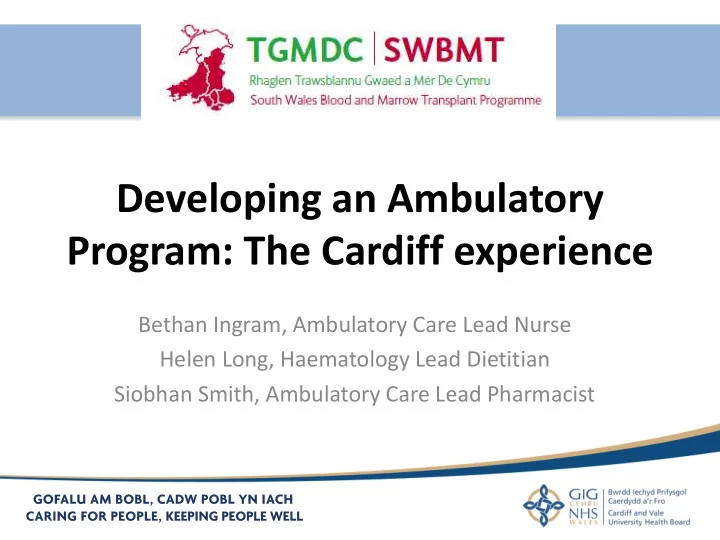

Developing an Ambulatory Program: The Cardiff experience Bethan Ingram, Ambulatory Care Lead Nurse Helen Long, Haematology Lead Dietitian Siobhan Smith, Ambulatory Care Lead Pharmacist
Background background Local need to increase the patient volume being treated, within existing infrastructure, whilst improvement patient experience • NICE – Haematological Malignancies Guidance (2016) • Cancer Delivery Plan for Wales (Welsh Assembly Government, 2016)
2006 experience 2006 Experience • Increasing waiting list for transplants • • Early morning Carer required to bloods & Nurse stay 24/7 • assessment daily in Access to vehicle • hotel Monitor • 4 times a week observations • medical review in Complete fluid day unit balance • Evening telephone call from nurse
2006 Experience 2006 experience Patient & Carer feedback: Challenges • Criteria tight • Practically challenging to transfer patients who are admitted: – Already symptomatic/ toxicities present – Patients comfortable! • No additional staff to facilitate model Staff feedback; No impact on workload
Available Resources Available resources • Commitment from directorate and UHB to support the project: – service commissioning review • Consultant buy in • Service Improvement team • Educational support • Accommodation for U25s
Patient Experience as a Driver for Change What works well currently? What could be improved? What do you think about AC?
Baseline Data: Process Mapping Baseline Data - Process Mapping
Scope of Ambulatory Transplant Scope of ambulatory transplant
Method – New AC Pathway New Ambulatory Pathway
Eligibility elegibility Strict operational policies were developed to protect patient safety, including eligibility criteria: • Live within 60 minutes of University Hospital of Wales (as per Google Maps) • Have someone at home who can offer practical support 24/7 • Read, speak and understand English • Have a mobile phone and be contactable 24/7 • Have access to transport 24/7 • AC and Consultant team must agree to individual patient receiving treatment in AC
Service Improvement Service improvement Plan Agree new ambulatory pathways Do Eligible patients were entered into the ambulatory Act programme Tweak the existing pathway Study Constant review of service, including patient experience, OOHs admissions
Barriers • Geographical challenges of Wales • Catchment area 30 to 60 minutes
Barriers to Change Barriers for change • New & unknown • Ethos of care • Lack of: – Available space – Team – Pharmacist • Ambulatory pumps • Stability data
Multidisciplinary Model of Care Multidisciplinary model of care
Ambulatory Care – Pharmacy Stability Studies Education Review Drug in cassette Managing chemotherapy Body Temperature toxicities & regimens to Drug in primed line convert to AC complications Regimen Supportive Medication specific care Care reminder cards pathways prescription
Stability Studies Stability of the drug in the cassette Stability of the dug in the primed line Stability at in use temperatures Stability on exposure to light
Stability Studies
Modification of Protocols Modifying the current chemotherapy protocols to enable delivery in Ambulatory care: Fluids Can we give less IV fluids Can we substitute for oral fluids? IV to PO Can we change medication from IV to PO- What is the bioequivalence? Mesna in ifosfamide and cyclophosphamide regimens Folinic acid and sodium bicarbonate in high dose methotrexate regimens What is the evidence for this? Are there reports in the literature of this being used? Is the safety and efficacy of current treatment maintained?
Patient Education
Dietetics Dietetics Importance of nutrition • Requirements Patient feedback • Intakes on hospital food; • Availability • Unpalatable • Timings Nutrition support • Portion sizes • Types • Benefits
Dietetics
Dietetics Ambulatory Data Collection: Weight loss Kcal requirements Protein met requirements met Inpatient 2.4% 72% 59% Ambulatory 4.6% 77% 65% Research project plans: • Nutrition • Activity • Body mass composition
Ambulatory Care Activity Ambulatory care activity • Complication review: – Infection rates – Thrombosis rates – AC issues
Cost Implications Cost implications Commissioning in Wales for BMT centrally funded Future Costs / Savings: Initial Costs: • Designated ambulatory nursing • Ambulatory Nurse lead team • Ambulatory Pharmacy Lead • Increased capacity within • Ambulatory Pump existing bed space – improved • Consumables efficiency • Time, commitment from whole • Unclear of consumable and team drug cost implications
Patient Experience Patient experience ‘It was very flexible from the start - they always told me, If there’s an issue, to come in. To me, I ’d rather be at home … At home you have the feeling of ‘I got better much quicker at independence. You can come down and home because it’s familiar, its watch TV, have a cup of tea’ comfortable. You have you clothes, your bathroom, your own bed and somebody is there’
Conclusions Conclusions • Our innovative ambulatory model has challenged traditional practice as the first for Wales • Pilot was developed as proof of principle and has demonstrated a safe and effective approach to delivering Autologous BMT for this patient group • Clear operational guidelines have ensured safety • Patients have benefitted from the normalised model of care
Acknowledgements Acknowledgements • Ann Jones, Service Improvement Team • Sarah Doherty, Laura Ricketts, Sheri Thompson, Martin Evans, Jennifer Proctor, Mary Harness, Jenny Labaton, Adam Didcott • Dr Keith Wilson, Dr Wendy Ingram, Dr Emma Kempshall, and Dr Clare Rowntree • Angharad Atkinson, Nia Evans & Sarah Irwin • BMT Data Management Team
Questions? Questions? Ambulatory Care Lead Nurse: Bethan Ingram, Bethan.ingram@wales.nhs.uk Haematology Lead Dietitian Helen Long, Helen.long@wales.nhs.uk Ambulatory Care Lead Pharmacist Siobhan Smith, Siobhan.smith@wales.nhs.uk
Recommend
More recommend